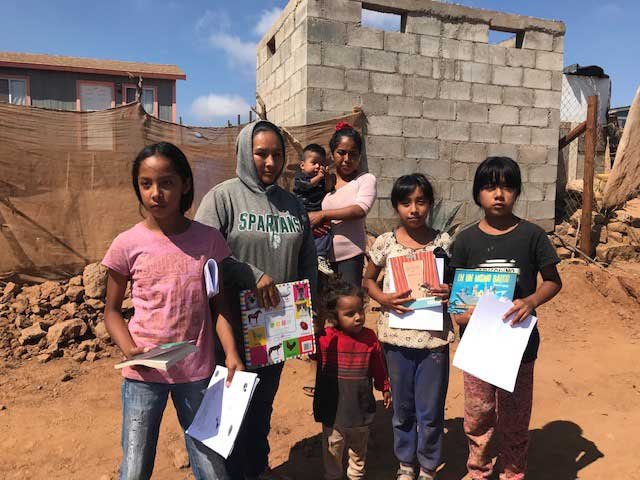Debra Blake and Carol Woodruff are among the many expats working with the local community to improve the living standards for everyone.
Their group, “Feeding Farmworkers’ Families,” focuses on those whose arduous labor provides sustenance not only for their neighbors, but also for communities outside the local area.
It all began about 41/2 – 5 years ago. Debra Blake joined a small group of volunteers, spearheaded by Barbara Bridge and Patty Rodriguez to offer an opportunity to provide some basic education, with an emphasis on English-language instruction, to the children of the farmworkers.
The volunteers hoped that once the kids were comfortable speaking some English, they could overcome their shyness regarding Gringos, and be more confident in seeking to communicate and collaborate with them; in this way, both the people from El Norte and the natives of Baja would benefit by employment options and through sharing the history and the traditions of both cultures.
The current school is very spartan, consisting of only a concrete foundation and a roof, a simple structure with no walls, having evolved to that point from teaching the kids who sat on blankets in the open air.
The boys and girls were naturally eager to have an opportunity to improve their opportunities through education, and of course their parents welcomed the chance to see their children broaden their horizons.
The school, “Escuela en Las Lomas,” quickly grew from a few families to 40 to 90 students, primarily the children of 30 Oaxacan farm worker families with whom the founding group of volunteers developed strong relationships of trust, great expectations, and hope for a brighter future. Unfortunately, the pandemic has forced the closure of this project.
The farmworkers who are the focus of the group’s efforts are very poor. Some of them live in homes provided by various church groups, but many others live with extended families in plywood and black plastic shacks with dirt floors. About half of the 30 families have no electricity, and none have running water.
Their homes, marginal as they are, can only be reached by a dirt road that is impassable during wet weather.
Prior to the Covid-19 pandemic, the families were already very poor, working hard in austere conditions to earn a meager $8 – $10 per day per person.
The pandemic very quickly resulted in the closing of schools, restaurants and other institutions dependent upon the produce that the farmworkers provided, thus reducing demand for their output by more than half.
This caused layoffs, which made an already needy community even more insecure; some families could not even afford to provide themselves with basic necessities, including food.
The food delivery program began in mid-April of this year; Carol and Debra expected (“hoped” is a better word) that the situation would be short-lived. Of course, that has not been the case.
The need for assistance to these struggling families continues to this day.
Carol and Debra obtained the despensa (“pantry”) guidelines from DIF (Desarrollo Integral de la Familia) in April and began to procure and distribute full allotments of rice, beans, lentils, sugar, eggs, milk, oil, oatmeal, canned vegetables, tomato sauce, pasta, tuna, and other basic nutritional needs every two weeks to the families in their care.
Eva’s Garden (a local organic grower/distributor) contributes an assortment of fresh, organic veggies.
In addition to food supplies, they are able to provide sanitary products from a regular donor who purchases them from Costco and donates them to the families through this team.
Carol says, “Our donors are families and friends. The Punta Banda community has been very generous.”
As schools remained closed due to the Covid crisis, Debra and Carol became aware that the children were in need of structured activities and materials that stimulated them to become more involved in learning.
To that end, Barbara Bridge provided the students with homework, which they actually loved; it gave them an opportunity to reinforce what they had learned in a classroom setting, such as writing and math skills.
The older students are given supplemental worksheets from LaRousse Publishing, the results of which are collected by Debra and Carol, who provide feedback and award stickers to reward the kids’ efforts.
Each child learns at his or her own pace, depending on individual capability and eagerness about a given subject. Age/grade levels are not relevant in such an environment; each child’s willingness to learn dictates how fast he or she will progress.
More recently, FFF provided a mobile library, which now has 75 books in Spanish, with more on the way. The kids are so grateful for this additional opportunity to grow and learn that they have proven themselves responsible by returning the books so that they may check out others.
Some of them are already on their 3rd book in as many weeks.
Beba ‘Cosmo,’ who teaches Early Childhood Education at Alocalo University, selected and provided the books. Beba is the owner of the popular Punto en el Cosmos Restaurant in Maneadero.
Other notables who have generously given their support to FFF prep and delivery operations are Hideyo Hirada, Chris Blake, Gary Woodruff, and Kathleen Estay.
Pris Austin of Los Adoptables in Maneadero adopts and treats the sick animals that the group sometimes encounters on their travels in the hills.
As Carol says, “It takes a village, and so many people have contributed in different ways.”
The next project underway is a collaboration with Baja Networks (Carlos Munguia) to install solar panels and a microwave receiver in an empty casita in the area without electric service; this will provide internet access to families and allow kids to attend classes via tv.
If you would like to make a donation to help our community to thrive, the FFF PayPal pool is https://paypal.me/pools/c/8oDfwG0bVK. Clothing and shoe donations suitable for hill terrain, non-perishable food, and school supplies are needed and would be greatly appreciated. Contact Debra Blake or Carol Woodruff via Facebook.



